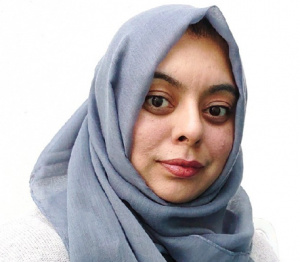Teacher of the Year 2025
Donna Hay Award for Impact 2025: Recognising the impact of outstanding educators
Teacher of the Year Award 2025

This year's Teacher of the Year Award goes to Kamona Karim from Putteridge High School!
Kamona is part of our Fellows community and is always incredibly supportive and so generous with her time. Back in October, not only did she arrange for two students from Putteridge to present at our celebration event, but she also took part in our panel discussion herself. Kamona and the girls also joined us at BETT in January, again giving audience members useful insights into our Innovate for Climate Change course. Kamona has also been busy delivering our courses to lots of students, and we are so thankful for all of her support.
Q&A with Kamona Karim
What do you see as the main benefits of Apps for Good?
Apps for Good is easily adaptable and works well with courses like computing, business, design, and PSHRE. Running it doesn't require you to be an expert in computers; all you need is a strong desire to show pupils that apps are capable of more than just entertainment. They have the power to inform, enlighten, and effect genuine change. It's incredible to observe how students' confidence, creativity, and teamwork increase as a result of the course's encouragement of students to take charge of their education. Both teachers and students find the experience to be incredibly fulfilling.
How do you think Apps for Good supports young people with the skills required to succeed in life and work?
The course effectively prepares young people for life after school by developing important employability skills such as communication, leadership, resilience, and digital confidence. It's more than simply learning how to use technology; it's also about learning how to collaborate with people, manage your time, accept feedback, and persevere even when things become tough. These are the kinds of abilities that will serve them well whether they pursue additional education, enter the workforce, or simply navigate their daily lives.
Can you share an example of where you have witnessed the Apps for Good experience having a positive impact on a student?
When I first began presenting Apps for Good, one of the first groups I worked with was quite shy and self-conscious. Initially, even speaking up in class was challenging. But, over time, I saw them improve not only in their talents, but also in their confidence. By the end of the programme, students were comfortable presenting to industry judges and conducting group discussions. They still can't believe they did it, but the experience has clearly stuck with them, and they're now comfortable speaking in front of both small and large groups.
Tell us about how your students respond when they’re working on something that matters to them.
When students are passionate about a topic, their work and enthusiasm improve substantially. We've seen students take on issues like mental health, food waste, and climate change. The experience of creating Apps for Good has instilled a sense of purpose and social awareness in students who previously lacked confidence and direction, demonstrating that their voices matter and that technology can be used to create positive change. Many now feel comfortable speaking out and sharing their ideas, and others have gone on to participate in other student-led initiatives such as Young Green Britain and Design4SDG.
What would you say to other teachers looking for new ways to teach computing?
I wholeheartedly recommend Apps for Good to other educators. It's an engaging and meaningful approach to bring technology to life in the classroom. What I like best is how it applies what pupils are learning to the real world. They start recognising that computing is more than simply coding; it is about creativity, problem solving, and using technology to make a difference. It also allows anybody to participate, not just those who identify as 'techy'. It is inclusive, inspiring, and truly helps students understand the power of their ideas.